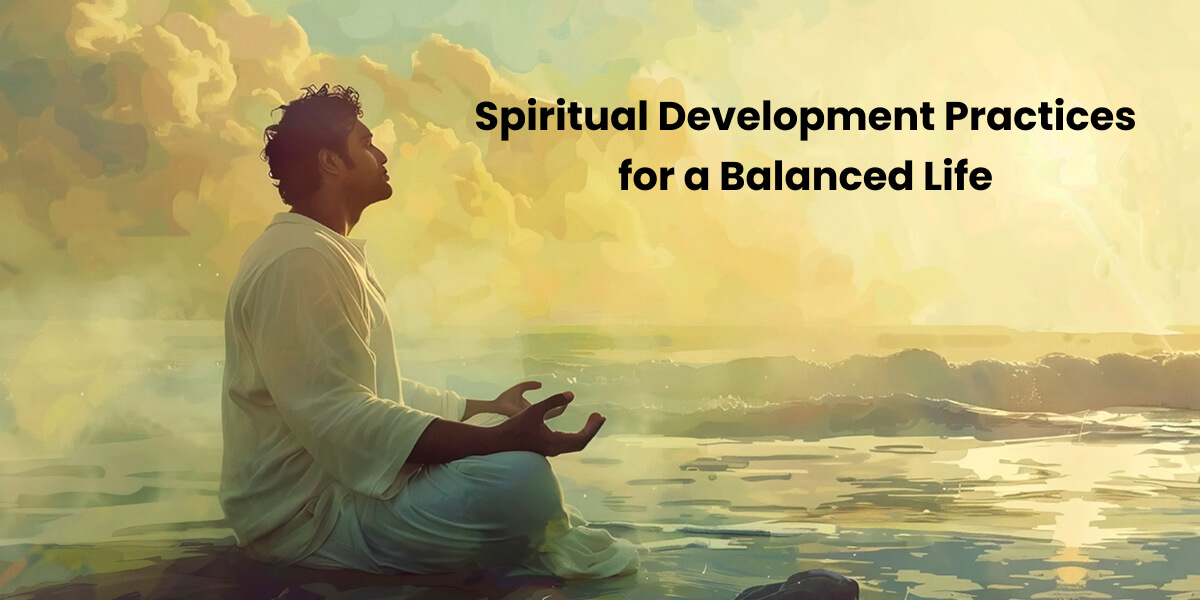The modern world is very dynamic and it is characterized by stress, uncertainty, and incessant distractions that leave many individuals overwhelmed. Success and happiness should be developed internally and the feeling of satisfaction will be enjoyed even in terms of minute moments. Spiritual development is important at this point.
Spiritual development is not contained in religious activities, but is a more personal experience of self- consciousness, inner transformation, spiritual relationship with higher ideals. Being cultivated, it can make us live more purposefully, balanced and in harmony.
This blog will answer the question of what spiritual development is, why it is so vital to live a balanced life, the principles that underlie this construct, and what are some of the practices that you can incorporate into your everyday routine.
What is Spiritual Development?
Spiritual development can be defined as the cultivation of the inner being so as to fulfil higher consciousness, purpose and harmony. It is more about working past material success and mapping life to other values like compassion, mindfulness, gratitude, and love.
Spirituality might be religious in some cases, and it can mean the connection with nature, the meditation, simple practice of conscious life in other cases. Spiritual development is all about exploring yourself and establishing the connection between the mind, the body and the soul.
Related Blog: What Is Spirituality? Understanding Its Meaning and Importance
Why Spiritual Development is Essential for a Balanced Life
The aspects of emotional and spiritual well-being require just as much attention because a truly balanced life does not only mean to balance the work, relations, and health, but also to keep aspects of our lives such as emotion and spirituality rather balanced. Spiritual imbalance, emptiness may be even material success.
Spiritual development offers:
- Peace of Mind- show us how to stay composed in the midst of stresses.
- Emotional Stability- Severing nervousness, dread and negative thought patterns.
- Purpose Clarity- directing us to meaningful ends as opposed to pursuing then having to move on to new things.
- Resilience – making us stronger to deal with life obstacles in a positive and courageous way.
In a word, spiritual growth makes our outer success in life to be supported by the inner balance.
Related Blog: How Science and Spirituality Complement Each Other?
Core Principles of Spiritual Development
Behind the spiritual development are immortal concepts of assisting an individual to live an aware and contented life:
- Self-Awareness -thoughts, emotions, behaviors.
- Mindfulness- Living in the moment with a full attention.
- Compassion Learning to be kind to ourselves and others.
- Gratitude- the ability to be thankful about what life has to offer, whether in a large or small amounts.
- Detachment-Releasing the attachment to either material things or results.
- Discipline – Building the discipline of taking spiritual actions like meditation or journaling.
- Connection- Integrating a feeling of belonging to nature, other humans or the spiritual world.
Key Spiritual Development Practices for Spiritual Growth
Spirituality can be enhanced in numerous ways, yet the next practices are some of the most effective ones:
1. Meditation
Meditation also enables one to relax his mental awareness. Stress, concentration and self-awareness can be lowered with as little as 10-15 minutes a day. Meditation makes an inner peace stronger once done on a regular basis and assists in casting out thoughts to the higher values.
2. Mindful Breathing
Even ordinary breathing exercises will relax the nerve system and make a person be aware of the here and now. Each day, during the day, one can practice conscious breathing to help relieve stress and re-find the mind in occurrences of outrageous proportions.
3. Yoga
Yoga is not only physical movement, but a combination of movement, breath and awareness. The yoga favours spiritual development, and assists its practitioners to acquire harmony between both the inner and the external worlds on the basis of balancing the body and the mind.
4. Journaling
Noting down the thoughts, emotions or the gratitude entries has been found to be very clarifying and also helps in self-reflection. Use of journaling is a useful method of tracking spiritual development and discovering any deeper trends of growth.
5. Prayer: or Affirmations
To religious people, prayer unites them with the energy of God. To some, affirmations are a nutshell of a reminder of positivity and inner strength. Both of these activities foster hope, faith and resilience.
6. Staying in Nature
One of the strongest spiritual teachers is the nature. The bare feet on the grass, people sitting on a beach or watching the sky full of stars makes the spine quiet and reminds me of the fact that everything is related to each other.
7. Good Gestures
Serving others even the slightest way would cultivate compassion and it would establish a feeling of having common humanity. Goodness is uplifting to communicator as well as recipient building spiritual relationship.
FAQs About Spiritual Development Practices
It may be abstract at times and it is normal to have questions when you are new in your journey. The following are some typical ones, answered in an easy-to-relate style.
Q1. What role does mindfulness play in spiritual growth?
Consider mindfulness as trying to learn to press the pause button in a busy and hectic world. Rather than living in yesterday lamenting what we could have done better or tomorrow worrying animals, mindfulness teaches us to pay attention to what is going on right here, right now. Once you are mindful, no matter whether it is when you are having a tea, when you are outside, or even doing tasks, you begin associating with yourself and the moment in question on a higher level.
It is just a slight change but it makes a world of difference. In the long run, you will realize that your mind is calmer, reactions are softer and feeling of peace is intensified. It is as though it offers your soul a space to breathe and that is the potency of mindfulness as a spiritual method.
Q2. What is the connection between yoga and spiritual balance?
Yoga can be much more than merely a stretch or exercise, it can be something that balances your body mind and feelings as well. As you connect your breath to the movement of your postures, you not only strengthen the body, but you train your mind to meditate and relax.
The harmony produces a feeling of inner calm, which tends to overflow into the normal daily life. Suddenly, you could find yourself to be less reactive, more patient and capable of facing your problems with a cooler heart. That is definitely the magic about yoga it does not only transform your body but how you represent yourself in the world.
Q3. What are some daily habits for spiritual growth?
Growing any more spiritual will not mean a radical change of your way of life it is all about the little rituals. Five minutes of meditating when you start your day, a list of the things your grateful of or a simple mindful breath during a busy day, they can all tend to your inner side.
Even simple acts of behavior (smiling at a stranger, helping a friend or spending some time alone with the nature) can come to be spiritual practices. All this accumulates and, as days pass by, you will feel much lighter, balanced and closer to your inner self.
Q4. Can spiritual development coexist with a non-religious lifestyle?
Yes, absolutely. Religion is not Spirituality. Religion is more about traditions and rituals but spirituality is more personal– of finding oneself, achieving peaceful existence and fulfillment. It does not even mean that you should be the member of organized group of faith to meditate, to practice gratitude or cogitate about your life.
Spiritual development is, plain and simple, a deeper individual understanding of how you live and that you are! As such, whether you are religious, spiritual-but-not-religious, or anywhere on the continuum in between the two, it does not make you incapable of developing spiritually according to your own means.
Q5. How can I track my progress in spiritual growth?
Spiritual growth cannot be counted with numbers in a way that it is more about how the person feels and how you will react to this life. Journaling is one of the ways that are helpful. Old entries can allow you to discover that the things that once caused you anxiety feel manageable now or that it is easier to forgive and slower to judge.
Growth is another indication based on how you cope with daily difficulties. Are you calmer in the whirlwind? Do you get closer to people? Such are silent and potent indications of improvement. A growth in spirituality is a long-term process and every small positive development is something to be rejoiced about.
Conclusion
Spiritual growth is not an ultimate goal, it is a way on the path which will allow you to feel more rooted, relaxed and connected. The little things that consistently happen daily– like the break to breathe and ponder the day or the acts of kindness–it is the breathes of these practices that gradually adjust the way we live our lives, the way we value the world that is around us.
In taking care of yourself inside, balance comes as a natural result. You start to see things with a clearer eye, deal with dilemmas with greater ease and enjoy the present. Remind yourself to proceed with the spiritual path as only you choose, because you are not in a race and there is no competition then, you just grow improving more and more each time to live a more harmonious life.









Post a Comment